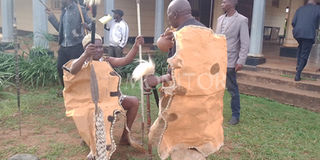Govt should sort out cultural bodies’ fights

Mr Nelson Mafabi (right) installs Mr John Wagabyalire as the new Umukukha of Bamasaba Cultural Institution in Mbale City on Saturday. PHOTO | RONNIE WESWA
What you need to know:
- We suggest that before the government allows any cultural institution to be reestablished, the documentation on who becomes king or leader and by what means or formula they become, is gazetted and made public
This newspaper reported yesterday that a faction beat security to install Mr John Amram Wagabyalire as the new Umukukha at dawn on Saturday with an audience of 15 people. Umukukha is the leader of Bugisu Cultural Institution, which was established in 2010 with Mr Wilson Wamimbi as its first leader after defeating Canon Codovia Wakiro in an election held in August of that year.
Bob Mushikori replaced him after a five-year term in 2015. Mushikori died in January 2021, sparking conflict between Mr John Wagabyalire who was elected in December 2021 and Mr Jude Mudoma who had been elected in October 2020 into the same seat. The fight is far from over, if we are to go by the happenings. Let’s digress a bit on the law. The 1995 Constitution green-lighted the return of cultural institutions. Article 246 provides for the recognition of traditional leaders and institutions:
“(1) Subject to the provisions of this Constitution, any group of people with a distinct culture, customs, practices, or a language may enjoy their culture, participate in cultural practices, and form, join or participate in the activities of cultural institutions.
(2) Parliament shall, by law, recognise and protect the existence of traditional leaders in accordance with the culture, customs, and traditions of the people to whom they belong; and such recognition shall be consistent with this Constitution.”
However, the framers may have not put into consideration the mayhem cultural institutions would cause across the nation because of difference of opinion and thirst for leadership, especially in cultural set-ups that were not as established as Buganda Kingdom.
Over the past two decades, cultural institutions; including Busoga Kingdom, Teso Cultural Union, Lango, and other emerging ones have been involved in the fight of who becomes boss.
Needlessly, the Ministry of Gender, Labour and Social Development has been boxed into endless fights.
What these fights sow is hatred, divisionism, and brews bad blood among communities that were peaceful before re-emergence of these institutions. And it boils down to one issue – failure to manage the leadership process. We suggest that before the government allows any cultural institution to be reestablished, the documentation on who becomes king or leader and by what means or formula they become, is gazetted and made public. Those that have succession questions should submit proper paperwork on leadership history and how the next head of the institution is picked. Any arising issues must be dealt with to save us future drama.
That way the ministry officials can easily refer to the established rules to guide on the way forward. Otherwise left alone – in a society where everyone views leadership at whatever level as a means of survival – Ugandans will continue to fight for ‘kingship’.




